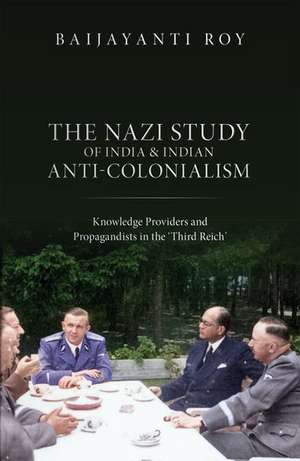The Nazi Study of India and Indian Anti-Colonialism: Knowledge Providers and Propagandists in the 'Third Reich'
Autor Baijayanti Royen Limba Engleză Hardback – 10 oct 2024
Preț: 505.71 lei
Preț vechi: 723.38 lei
-30% Nou
Puncte Express: 759
Preț estimativ în valută:
96.77€ • 101.24$ • 80.39£
96.77€ • 101.24$ • 80.39£
Carte disponibilă
Livrare economică 03-08 martie
Preluare comenzi: 021 569.72.76
Specificații
ISBN-13: 9780192887542
ISBN-10: 0192887548
Pagini: 240
Ilustrații: 20 black and white images
Dimensiuni: 162 x 240 x 20 mm
Greutate: 0.6 kg
Editura: OUP OXFORD
Colecția OUP Oxford
Locul publicării:Oxford, United Kingdom
ISBN-10: 0192887548
Pagini: 240
Ilustrații: 20 black and white images
Dimensiuni: 162 x 240 x 20 mm
Greutate: 0.6 kg
Editura: OUP OXFORD
Colecția OUP Oxford
Locul publicării:Oxford, United Kingdom
Recenzii
Roy's book is a brilliant piece of scholarship, indispensable for any study of the connections between British India and Nazi Germany, specifically Nazi Germany's efforts to influence Indian public opinion.
Notă biografică
Dr Baijayanti Roy studied modern Indian and modern European history at the University of Calcutta in India. She received her PhD from the Goethe University, Frankfurt. Her dissertation has been published as a monograph, titled The making of a Gentleman Nazi: Albert Speer`s Politics of History in the Federal Republic of Germany. She is currently affiliated to the History Department of the Goethe University. She has published widely and spoken on different subjects including Nazi Germany, Hindu nationalism, the history of German Indology as well as aspects of the historical relationship between Germany and India.
